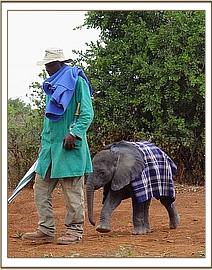At the far Southern end of Tsavo West National Park is Lake Jipe, lying across the Kenyan/Tanzanian border, a beautiful lake that was once the unique jewel of Tsavo West, being the only natural lake in the vast 8,000 square mile arid scrubland that comprises Kenya’s famous Tsavo National Park
At the far Southern end of Tsavo West National Park is Lake Jipe, lying across the Kenyan/Tanzanian border, a beautiful lake that was once the unique jewel of Tsavo West, being the only natural lake in the vast 8,000 square mile arid scrubland that comprises Kenya’s famous Tsavo National Park. Sadly, due to environmental degradation caused by an overload of Masai cattle both on the Tanzanian side of the lake boundary, as well as illegal incursion into Tsavo West itself by these tribesmen and their bovine hordes, (about which the authorities seem disinclined to take action), the lake is rapidly receding, and is set to dry up entirely within the next ten years unless corrective measures are taken both sides of the border. As its waters recede the caked mud shoreline poses a deadly threat to the wildlife that relies on the water of Lake Jipe to slake their thirst. It was the quicksand mud of Lake Jipe’s shoreline that took a tiny 3 week old bull calf from his elephant mother and family.
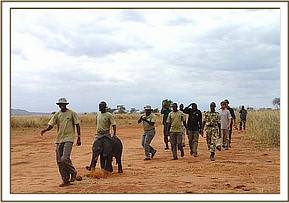

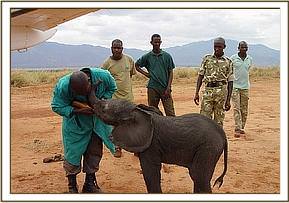
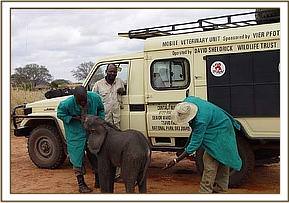

We in Nairobi were alerted the next morning (3rd October - again a Sunday!), but unusually hit a snag for there was not one aircraft available at Wilson airport to undertake the rescue, all being out due to the recent resurgence in tourism. The only available plane belonged to a new Company called Safari Link who were not prepared to undertake the rescue for less than full commercial rates, so saving little Jipe turned out to be a very expensive exercise. However, when dealing with the life of an elephant, and especially one that is newborn, time is of the essence, and cost considerations do not come into it, for an elephant life is precious. For us little “Jipe” represents a milestone for the Trust’s Orphans Project, for he is the 60th infant African Elephant to have been saved. That after all, in our book at least, is something that cannot be quantified in monitory terms, support of wildlife being our very “raison d’etre”!
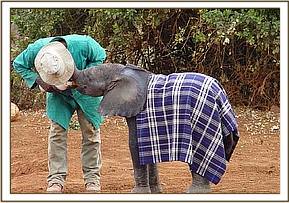
Early the next morning, Joseph Sauni and our Mobile Vet headed for Jipe, and the Safari Link plane left at 1.30 p.m., with Robert aboard to film events for BBC’s “Elephant Diaries”. Tiny “Jipe”, having had the prophylactic antibiotic injection, and a feed of milk, walked trustingly alongside his new family and was loaded into the aircraft, arriving at the Nairobi Nursery at 6 p.m. Back at the Nursery, he downed some more milk, and was placed in the stable next door to that of Sunyei. When the Nursery elephants returned from the bush for the night, Sunyei was over the moon to discover a new baby next door. So excited was she that we had to allow her time in with him, when she greeted him lovingly and with great gentleness, fondling him all over with her trunk. During his first night in the Nursery next door to Sunyei, little Jipe fed well but slept little, not surprisingly still psychologically unsettled by such an unexpected twist in his short life, and today, 4th October, he is out and about with all the others, sheltered from the sun by an umbrella, with ears that are already sun damaged plastered in sunblock. Of course, we anticipate the usual tummy problems since he would undoubtedly have swallowed copious quantities of mud, and we will have to weather the usual teething problems, but being the 60th baby, we have done it all before, although one can never be complacent due to the fragility of an elephant infant. Welcome to the fold, little Jipe!
